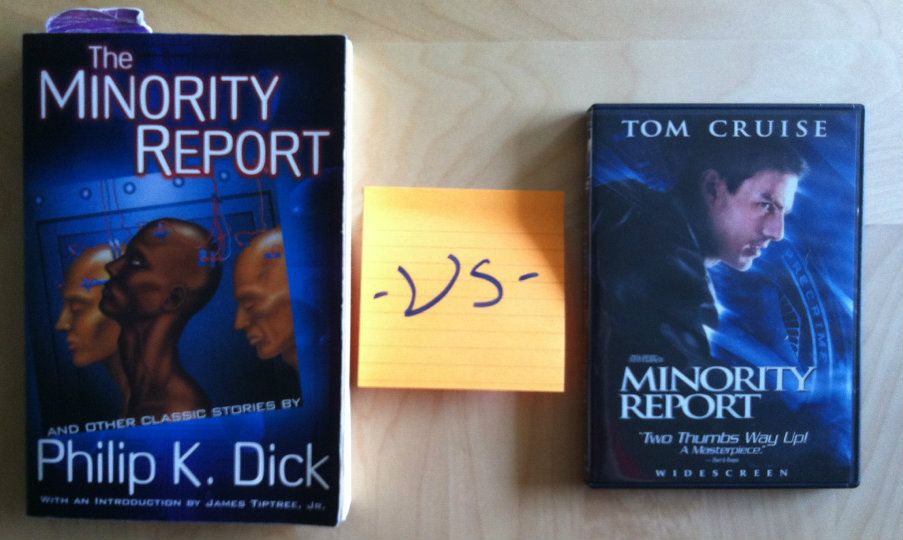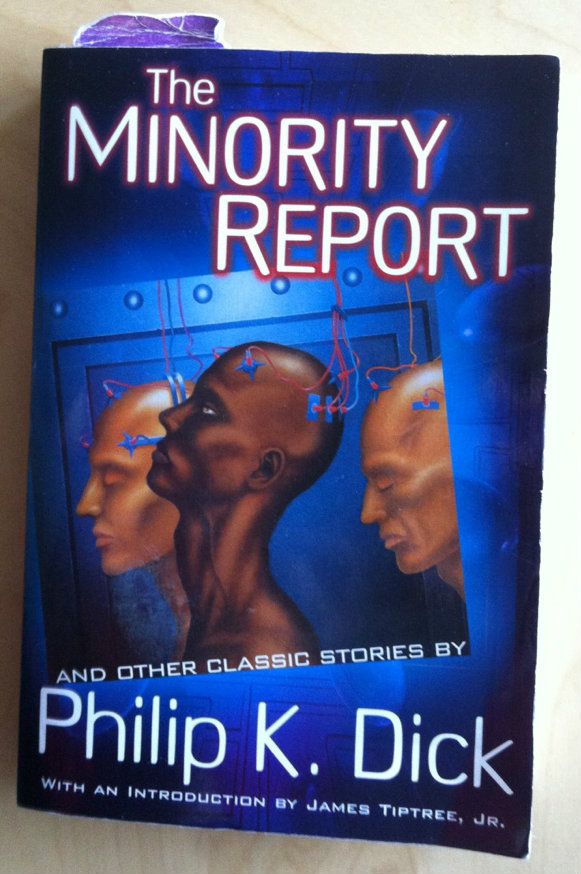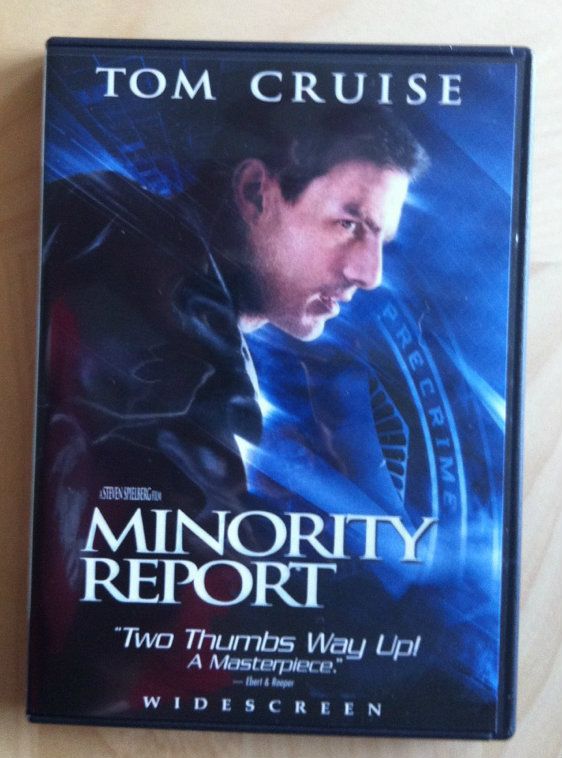Or a comparison between the source and the adaption.
One of the interesting consequences of having so many different flavours of media these days is that things have a tendency to be adapted between formats. Comics become movies which are adapted to novels which inspire TV shows which spin into new comics. Each media transition often involves different people with different objectives, goals, and creative tastes. Each flavour of media has its own individual strengths and weaknesses. While the core story can never really be completely divorced from its creators or media, I think it's a fun game to compare different versions of the same story and see which I like best.
In the following essay I will discuss and compare the classic Phillip K Dick short story The Minority Report with the Steven Spielberg action film adaptation The Minority Report.
The Minority Report, by Phillip K Dick, was originally written as a
short story. The premise of the story, the Sci-Fi of it, is that law
enforcement has become PREcrime and is able to apprehend criminals
prior to their committing a serious crime. This is accomplished trough
the use of Precogs: malformed and vegetative humans cursed by mutation with the
ability to observe the future. By tapping into these visions, actual
crime has been essentially eradicated and only potentially culpable
people are imprisoned.
It is important to note that there are three Precogs who each independently predict a persons culpability and that, due to the vagaries of predicting futures, are not always in total agreement. There frequently exists a slightly different version of events termed a "minority report", although typically this still points to a person's guilt with only a few details altered.
The story itself is quite simple (for Dick). The director of Precrime, Anderton, becomes implicated by the Precogs as the future murderer of Leonard Kaplan, an army general. However, a minority report predicts that Anderton would not kill the General and was thus pre-innocent instead of pre-guilty. This suggested that Anderton, by learning about his future crime, changed his fate and decided not to commit murder which, if true, would invalidate the whole concept of Precrime (pre-guilt equates to actual guilt).
Except that, in the end, Anderton kills General Kaplan to save Precrime.
So the logic of the book breaks down to Anderton always murdering the General. The first Precog report sees Anderton assassinating General Kaplan during an army coup attempt, which makes him guilty. The minority report, the second report, portrays a future where Anderton learns about his future guilt and opts not to murder the General making him innocent. The third and final report, also suggests that Anderton kills Kaplan and is recorded as part of the majority report. This report predicts the true future where Anderton becomes aware of General Kaplan's aspirations for power and his plan to discredit and dismantle Precrime and decides to murder him to prevent that outcome.
It's a brilliant portrayal of fate, not as a preordained plan, but as the outcome of human decision making. An emerging thought in psychology and neurobiology is that free will, as we know it, is an illusion and that our decisions are instead governed by a complex interplay of genetics, environment, and formative education. In this paradigm, an individual is essentially programmed to respond to stimuli and will react to the same situation virtually the same way every time. It's like we are just inexplicably complex computers. This short story, from decades before this concept has gained vogue, is a beautiful illustration of the idea that free will is a lie.
It's a very good short story.
The Adaptation: The Minority Report Film, Directed by Stephen Spielberg
The Minority Report Adaptation is a film directed by Steven Spielberg with a screenplay by Scott Frank, Jon Cohen, and John August. It stars Tom Cruise, Colin Farrell, Samantha Morton, and Max von Sydow. It's basically a straight up action film shot in an over-lit retrofuture (by 2012 standards) with the basic trappings of the Phillip K Dick short story from which the movie takes it's name.
John Anderton (Tom Cruise), is chief of Wasington DC Precrime, a department of the police that uses Precogs to prevent homicides before they happen. The overall concept of precognition is the same as in the short story except that the Precogs are cognizant human beings who are the children of drug addicts, and that they work as a "hive mind" that requires the female Precog Agatha (Samantha Morton) to function. The story takes place just as Precrime, which is in a trial phase, is being considered for national national expansion. This leads to an audit by office of the US Attorney General which sends Danny Witwer (Collin Farrell) to investigate Precrime. During his investigation Witwer discovers that Anderton is a man haunted by his past: his son was kidnapped and murdered shortly before the implementation of Precime and that he is taking narcotics to numb the loss. It's also during this investigation that the Precogs predict John Anderton will murder of Leo Crow, a man he has never met. Anderton escapes, action scenes ensue including a jetpack fight scene and a fist fight in a robotic car manufacturing plant that is as gratuitous as it is cliche. Oh and there is a fuckton of product placement.
Eventually, Anderton learns about the concept of Minority Reports, a prediction of events that disagrees with the others, and that they are routinely deleted in the official prediction of future events. He also learns that the events are retained inside the minds of the Precog Agatha. So Anderton has his eyes surgically swapped out so that he can go about unseen by retina scanners and kidnaps Agatha from Precrime.
From Agatha he learns two key things: 1) There was no Minority Report in his crime and that all predictions say he will kill Leo Crow and 2) there is a Minority Report in the premurder of Anne Lively, a drowning victim, that exposes irregularities in Precrime. Another chase scene ensues where Agatha uses her sight of the future to to help them escape a mall for more product placements. He eventually tracks down Leo Crow in a hotel room filled with photographs of children including John Anderton's murdered son.
John Anderton understandably goes off the handle and, as the time of murder approaches, it looks like he will indeed kill Crow.
Except he doesn't. Anderton changes his fate and arrests him instead. This completely invalidates the idea of precognition.
But Leo Crow was a setup, paid to pose as the murderer of Anderton's son to get Anderton to murder him. To ensure his family is paid Crow gets himself shot and creates a scene much like what the Precogs preidcted...
And then things get complicated.
Witwer, the guy from the Attorney General, figures out that Anderton is innocent and that Ann Lively's murder has been conducted by someone with access to Precrime. You see, due to a discrepancy in wave direction, there were actually two murders of Anne Lively: the first which was stopped and a second successful one that was staged to look identical to the first one but occured at a later time (hence the wave direction change). The report of the second murder was lost as an "echo" of the first and deleted. Lamar Burgess (Max von Sydow), the director of Precrime, then reveals himself to be the culprit as he murders Witwer (which isn't caught by Precrime because Anderton has Agatha).
And then a lot of nonsensical events happen that really aren't that important but result in getting Anderton and director Burgess to the same place for the films climax.
John Anderton confronts Burgess, and publicly reveals his culpability in the murder of Anne Lively, the mother of Agatha. A Precrime report is created for director Burgess killing Anderton in retaliation and the police go into motion. Eventually a scene occurs where Burgess corners Anderton with a gun in the same manner as predicted by the Precogs. Anderton then lays out the predicament of the director: kill Anderton and prove Precrime right and go to jail or do not kill Anderton and disprove Precrime (and likely go to jail anyways for the murder of Anne Lively).
Burgess instead changes his fate and kills himself. Again disproving precognition.
The film ends with Precrime dismantled, Anderton reunited with his estranged wife (Kathryn Morris), and the Precogs in a remote cabin living out their lives.
This movie is somewhat competently made but is overall pretty terrible. I really do not care for Tom Cruise or Collin Farrell as actors, I found many action sequences pretty farcical, and the movie's script had some pretty tremendous plot holes, contradictions and just oddly perplexing, tonally inaccurate sort-of-jokes sprinkled throughout. Which would all be forgivable if the central core of the story were any good. Unfortunately, the movie takes Dick's brilliant meditation on the myth of free will and instead tells a story about overcoming fate through choices that is absolutely nonsensical. Characters in the film are either slaves to fate or able to overcome it with seeming randomness. Some murders and events are perfectly predicted. Anderton is predicted to commit murder, except he doesn't. Burgess commits two murders and isn't caught, and then, rather than commit murder he chooses to alter fate and kill himself. The movie, then, completely contradicts its own premise in a way that I guess is supposed to make a statement on free will, but really just comes off as confusing.
The Verdict: Read the short story, Avoid the film.
Obviously, I'm giving this one to the Minority Report short story by Phillip K Dick. It is both a brilliant piece of Science Fiction and a great example of a complex idea expressed with tremendous internal logic. It's great fiction and tremendously thought provoking. The Minority Report film, in comparison, is an overtly complicated action film that continually violates its premise (fate is real and so is free will, which is incompatible) and internal logic. It also completely violates the source material in a hamfisted way that just comes off as misguided instead of deliberate.



Of all the Philip K. Dick-based movies I must say that I thought Minority Report was the worst, typical sentimental commercial garbage from Spielberg. Thank God there are directors like John Alan Simon making PD-based movies that are good. A comparison of PKD's novel RADIO FREE ALBEMUTH with the movie of the same name would be interesting. Thanks for the report.
ReplyDeleteHas the Radio Free Albemuth movie come out? I'm terrible at keeping up with this kind of thing... But a movie -vs- novel for RFA would totally be up my alley. I read VALIS last Winter and had my mind solidly blown, so it should make for some trippy fun.
DeleteI've also got nebulas plans to do a We Can Remember It For You Wholesale -vs- Total Recall -vs- Total Recall and a Do Androids Dream of Electric Sheep -Vs- Bladerunner. Slightly hampered by my recent "get media legally kick"... its a pain in the ass. Also Canadian Netflix is terrible and the great Sci-fi used bookstore in my city just closed...
Well done, Michael Bround. Only wish it had ended up in PKD Otaku. But it's something that is seriously needed to counteract the proliferating mindless movie adaptations of Philip K. Dick's short stories and novels, to include one sequel and one remake. And I would agree with his eminence, Sir Lord Running Clam (how DO clams run??) that the movie version Minority Report is "sentimental commercial garbage." Someone is making money off of Phil's works, and it's not him. He died about a year after I was fortunate enough to interview him.
ReplyDeleteThanks, I find the frisson between the quality of the books and the misfires of the movies endlessly fascinating. Like, how can people be such fans of his work so as to make the movies in the first place, and yet make such a mess of them in such fundamental ways? There is really no shortage of material to mine there either...
Delete(Although, I'd argue this is a problem in most Novel to Film Sci-fi adaptations.)
I really hope that Mr. Dick's estate benefitted from these terrible movies in some way. It's a considerable shame that the movies weren't somewhat better: it'd be great for a wider audience to enjoy his distinct vision and while Mr. Dick may not benefit financially I imagine he would've appreciated more people enjoying his work. Maybe one day a truer fan will get a shot at a PDK adaptation?
You hit upon the proverbial sticky wicket, "Mr. Dick's estate." They are the ones giving permission and the one's that need to take some kind of responsibility for the final products and own up to the failures. But they won't. They're staying hidden behind their lawyers and marketing rep. But please do consider adding your perspective to the next issue of PKD Otaku.
DeleteI think that truer fan is John Alan Simon. His adaptation of RADIO FREE ALBEMUTH is a stunner. I saw the film with the other fans at the 2012 PKD Fest in San Francisco and it was very well received. I want to see it again as there is much to go back to in the movie. We're hoping it will go into general release in 2013. PKD OTAKU would be a great place for your thoughts, Michael, hope to see you within. And, Frank, in our natural Ganymedean environment we motate much like jellyfish - a primitive form of propulsion like the pulse-jet engine except we do not explode fuel inside of us but rapidly collapse our integument around our 'air' thus forcing it out and away and we go in the opposite direction. A principle that, curiously enough, does not seem to be used by mankind.
ReplyDelete